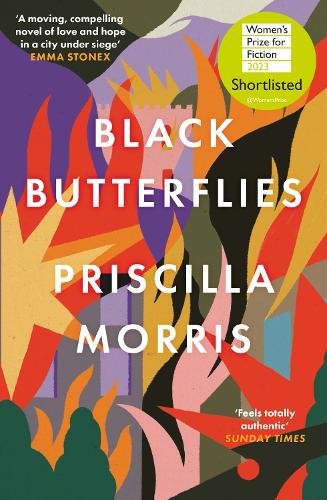One of the things I love about following book prizes is that they sometimes highlight books which weren't on my radar that I probably wouldn't have read otherwise. When the Women's Prize for Fiction 2023 longlist was announced it was the first I'd heard about “Black Butterflies” but this debut novel certainly packs an emotional punch and I was enthralled by its harrowing story. It begins in the Spring of 1992 as tensions are rising in the city of Sarajevo. Zora is a teacher and respected artist whose elderly mother is poorly. When she asks her older husband to accompany her mother to the English countryside to stay with their daughter, Zora plans to eventually join them. She's reluctant to leave this diverse and beautiful city she loves. However, when the Bosnian War escalates and conditions turn dire she and her friends and neighbours find themselves trapped in a metropolis which is continuously bombed while essential utilities cease and resources dwindle. This personal tale shows the first year of the Siege of Sarajevo from the inside. It contains heartfelt moments of humanity and instances of vicious cruelty as the resilience of these survivors is severely tested in brutal circumstances.
Though its narrated in the third person, this novel presents the world fully through Zora's perspective. So the city is shown to be full of superb architecture, surrounded by a gorgeous environment and rich with delicious food. As a historic crossroad and European centre it's also filled with people from many different cultures and backgrounds. But dramatic political changes mean that distinctions in nationality and religion which didn't matter before now mean everything. Nearly every ordinary citizen is either a target or under suspicion. It's horrifying how conditions deteriorate so quickly as the city turns into a war zone. The novel powerfully captures the way this creates a surprising juxtaposition of normalcy and desolation. It also produces odd intimacies with strangers on the street and neighbours. Sometimes this sudden closeness is fleeting as people shelter from an attack and other times it forms bonds which last. We witness how communities can come together and how strangers often argue about possible misinformation while waiting in long lines for water. I felt so drawn into Zora's experiences it made these conditions feel increasingly palpable and frighteningly real.
Amidst so much death and destruction, it's very moving how the novel presents art as not just a frivolous respite but an essential testament. Zora became famed for her paintings of bridges not only as a symbol which connects people to each other but as magnificent objects. The story traces how her attitude toward her art and its practice are changed by larger events. While she continues to teach her remaining students, she takes a neighbour girl under her tutelage and they create pictures with what materials are available. This relationship and the desire for people to still experience beauty comes to feel so precious especially as the assault reaches the city's most sacred landmarks and the meaning of the novel's title becomes clear. A community art show which might seem quaint in other circumstances here feels like a last string of humanity which people desperately cling to and it becomes a poignant celebration.
I don't know a lot about the Bosnian War and reading this powerful story has prompted me to want to learn more. But it also shows how even many of the civilians caught in the crossfire or forced into military service didn't understand what the fight was about which adds to an understanding of the absurdity and senselessness of war. It's a timely reminder that even the most robust civilizations become terrifyingly fragile when fear and hatred are allowed to create divisions. So I became thoroughly emotionally invested in Zora's struggle. The book grows increasingly tense in a way which kept me gripped but also woke me up to the reality of how such assaults on ordinary citizens has happened and continues to happen in other parts of the world today. It's an accomplished work of fiction and I'll be eager to read anything Priscilla Morris publishes next.









